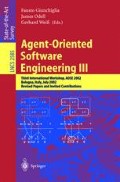Abstract
This paper introduces a methodology for the development of multi-agent systems, in particular multi-agent systems that optimize the collaboration of distributed work groups like clinical departments. A major difficulty with such systems is requirements elicitation, because intimate knowledge of the work processes is needed to identify the potential agent application scenarios. In the face of uncertain requirements, our methodology exploits some ideas from agile software development approaches such as Extreme Programming, namely the values of collaboration with domain experts and of human creativity driven by rapid feedback. We support collaboration by means of a tool-supported modeling approach that allows one to capture existing and agentified processes in a format that is sufficiently simple to be understood and maintained by domain experts. These process models can be automatically synchronized with executable agent source code, so that rapid feedback is ensured. We support creativity by means of a searchable repository of reusable agent design patterns and other types of process modeling knowledge.
Access this chapter
Tax calculation will be finalised at checkout
Purchases are for personal use only
Preview
Unable to display preview. Download preview PDF.
References
B. Bauer, J. P. Mueller, and J. Odell. Agent UML: A formalism for specifying multiagent software systems. In P. Ciancarini and M. Wooldridge, editors, Agent-Oriented Software Engineering. Springer-Verlag, 2001.
K. Beck. Extreme Programming Explained. Addison-Wesley, 1999.
F. Bergenti and A. Poggi. Exploiting UML in the design of multi-agent systems. In Proc. of the ECAI Workshop on Engineering Societies in the Agents’ World (ESAW), Berlin, Germany, 2000.
S. Bussmann, N. R. Jennings, and M. Wooldridge. On the identification of agents in the design of production control systems. In P. Ciancarini and M. Wooldridge, editors, Agent-Oriented Software Engineering. Springer-Verlag, 2001.
G. Caire, F. Leal, P. Chainho, and et al. Agent oriented analysis using MESSAGE/ UML. In Proc. of Ontologies in Agent Systems Workshop, Agents 2001, Montreal, Canada, 2001.
S. Cranefield, S. Haustein, and M. Purvis. UML-based ontology modelling for software agents. In Proc. of Ontologies in Agent Systems Workshop, Agents 2001, Montreal, Canada, 2001.
S. DeLoach, M. Wood, and C. Sparkman. Multiagent systems engineering. The International Journal of Software Engineering and Knowledge Engineering, 11(3):231–258, 2001.
M. Jarke. Requirements tracing. Communications of the ACM, 41(12):32–36, 1998.
N. Jennings, K. Sycara, and M. Wooldridge. A roadmap of agent research and development. Int. Journal of Autonomous Agents and Multi-Agent Systems, 1(1):7–38, 1998.
H. Knublauch, H. Koeth, and T. Rose. Agile development of a clinical multi-agent system: An Extreme Programming case study. In Proc. of the Third International Conference on eXtreme Programming and Agile Processes in Software Engineering (XP 2002), Alghero, Sardinia, Italy, 2002.
H. Knublauch, T. Rose, and M. Sedlmayr. Towards a multi-agent system for pro-active information management in anesthesia. In Proc. of the Agents-2000 Workshop on Autonomous Agents in Health Care, Barcelona, Spain, 2000.
H. Knublauch and T. Rose. Round-trip engineering of ontologies for knowledgebased systems. In Proc. of the Twelfth International Conference on Software Engineering and Knowledge Engineering (SEKE), Chicago, IL, 2000.
H. Knublauch. KBeans: Implementing semantic transparency for components and domain models. Technical Report FAW-TR-01001, FAW Ulm, 2001.
H. Knublauch. Extreme Programming of multi-agent systems. In Proc. of the First International Joint Conference on Autonomous Agents and Multi-Agent Systems (AAMAS 2002), Bologna, Italy, 2002.
J. Lind. Patterns in agent-oriented software engineering. In (This book). 2003.
W. Rammert, M. Schlese, G. Wagner, J. Wehner, and R. Weingarten. Wissensmaschinen: Soziale Konstruktion eines technischen Mediums. Das Beispiel Expertensysteme. Campus Verlag, Frankfurt, Germany, 1998.
T. Rose. Visual assessment of engineering processes in virtual enterprises. Communications of the ACM, 41(12):45–52, 1998.
C. Rupprecht, M. Fünffinger, H. Knublauch, and T. Rose. Capture and dissemination of experience about the construction of engineering processes. In Proc. of the 12th Conference on Advanced Information Systems Engineering (CAISE), Stockholm, Sweden, 2000.
K. Sycara, K. Decker, A. Pannu, M. Williamson, and D. Zeng. Distributed intelligent agents. IEEE Expert, 11(6), 1996.
M. Wooldridge and P. Ciancarini. Agent-oriented software engineering: The state of the art. In P. Ciancarini and M. Wooldridge, editors, Agent-Oriented Software Engineering. Springer-Verlag, 2001.
M. Wooldridge, N. Jennings, and D. Kinny. The Gaia methodology for agentoriented analysis and design. Journal of Autonomous Agents and Multi-Agent Systems, 3(3):285–312, 2000.
Author information
Authors and Affiliations
Editor information
Editors and Affiliations
Rights and permissions
Copyright information
© 2003 Springer-Verlag Berlin Heidelberg
About this paper
Cite this paper
Knublauch, H., Rose, T. (2003). Tool-Supported Process Analysis and Design for the Development of Multi-agent Systems. In: Giunchiglia, F., Odell, J., Weiß, G. (eds) Agent-Oriented Software Engineering III. AOSE 2002. Lecture Notes in Computer Science, vol 2585. Springer, Berlin, Heidelberg. https://doi.org/10.1007/3-540-36540-0_15
Download citation
DOI: https://doi.org/10.1007/3-540-36540-0_15
Published:
Publisher Name: Springer, Berlin, Heidelberg
Print ISBN: 978-3-540-00713-5
Online ISBN: 978-3-540-36540-2
eBook Packages: Springer Book Archive

